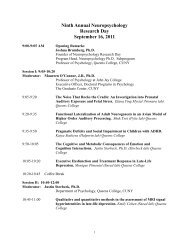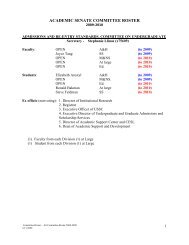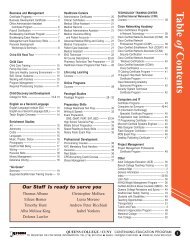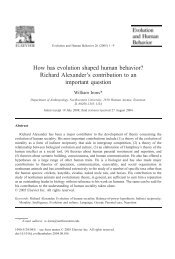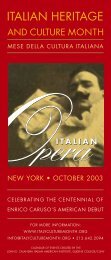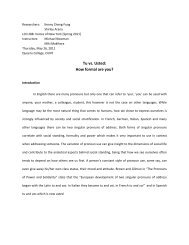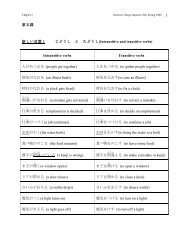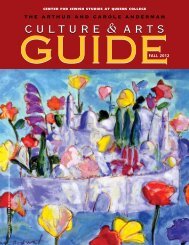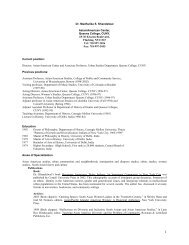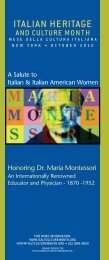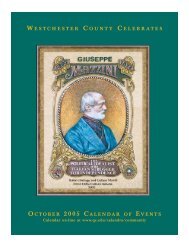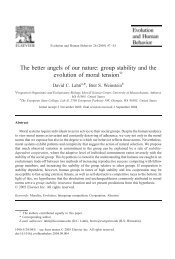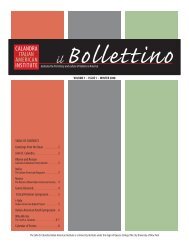Writing Nonfiction Prose
Writing Nonfiction Prose
Writing Nonfiction Prose
You also want an ePaper? Increase the reach of your titles
YUMPU automatically turns print PDFs into web optimized ePapers that Google loves.
<strong>Writing</strong> <strong>Nonfiction</strong> <strong>Prose</strong><br />
Professor Nancy Agabian<br />
English 211 W<br />
Office: Klapper Room<br />
318<br />
Section CT3RA<br />
Office hrs.: T/Th 3 – 4 pm<br />
T/F 12:15 – 1:30 (718) 997-4619<br />
Kiely 273<br />
Nancyagabian@yahoo.com<br />
Spring 2008, Queens College<br />
Creative <strong>Nonfiction</strong><br />
Course Objectives: To explore the genre of creative nonfiction by writing and reading three<br />
different modes: memoir, personal essay, and literary journalism. To become aware of the<br />
various ways in which these forms overlap in terms of content, style, structure, and most of all,<br />
the writer’s voice. To creatively experiment in order to find subjects you enjoy writing about<br />
and a style that is unique to you. To collaboratively form a supportive environment to help<br />
everyone express themselves. To improve your writing and to become more confident about it<br />
over the course of the semester.<br />
Required Materials:<br />
- Best American Essays, 5 th Edition, ed. Robert Atwan. At the Queens College<br />
Bookstore.<br />
- A course packet of readings you can purchase at the Queens Copy Center, 65-01<br />
Kissena Blvd., across from the main campus gate.<br />
- A notebook<br />
- A folder to keep handouts and all your assignments<br />
- A pen you enjoy writing with<br />
Course Requirements:<br />
1. Assignments<br />
- Memoir, 3 - 5 pages<br />
- Personal essay, 3 - 5 pages<br />
- Literary journalism article, 3 - 5 pages<br />
- Final project, 6 - 10 pages<br />
More information about these assignments will be given closer to when they are due. We<br />
will spend four weeks reading, discussing and developing each sub-genre of nonfiction. The<br />
following four weeks will consist of workshops; each person will receive feedback on his or her<br />
assignment from the class as a whole. A week before assignments are due, I will bring in a sheet<br />
that specifies the date when you will turn in your assignment. On that date you will bring in<br />
your assignment with copies (16) for everyone to read at home in order to give you feedback the<br />
following class session. You will then revise based on the comments you receive, turn in your<br />
first draft and the revised draft within a week for a grade. Assignments that have not been<br />
critiqued will be deducted by one letter grade (e.g. a B assignment turned in late will receive a<br />
C). Late assignments will also be penalized, whether first or revised drafts, by 1/3 a letter grade<br />
for each day late.
2. Journal<br />
-14 entries, which I will collect every Thursday. Each entry should be at least one singlespaced<br />
handwritten page or one double-spaced type-written page.<br />
The journal is a device to keep you writing regularly and to help you develop writing for the<br />
assignments. Your entries can be on any topic and can take any form; they can even be the<br />
written responses for exercises that I give to you in class. If you have trouble thinking of a topic,<br />
I have given suggestions in the syllabus. Choose one entry from your journal each week to turn<br />
in for a point of credit. Journals will not be graded.<br />
3. Participation<br />
You are expected to contribute to class discussions on the readings and to give feedback<br />
to your peers during workshop sessions, both written and verbal. Talking and thinking about<br />
other writers’ work is a key element to developing your own writing.<br />
If you miss more than four classes, your course grade will suffer. Being punctual is<br />
especially important for this class, since it meets for only an hour and fifteen minutes. Two<br />
latenesses over ten minutes will count as an absence. Please let me know ahead of time if you<br />
know you will be late or absent.<br />
A note on plagiarism: Don’t do it. There is a lot of freedom in this class to choose topics<br />
you’re interested and passionate about. A few people have abused this in the past to turn in<br />
pieces purchased from the internet, so I’ll be asking you to also submit your first drafts through<br />
Turn it In on Blackboard. People plagiarize when they are stressed out and desperate. If you are<br />
in this predicament it’s better to talk to me than jeopardize your academic future. If you<br />
plagiarize, you’ll receive a 0 for the assignment and I’ll report you to the English Department.<br />
Final Grade Breakdown:<br />
Memoir: 20%<br />
Personal Essay: 20%<br />
Literary Journalism: 20%<br />
Final project: 15%<br />
Journal: 15%<br />
Participation: 10%<br />
Schedule of turn-in dates:<br />
1. Memoir Narrative: Peer review: 2/14-2/26; final draft 2/26-3/6<br />
2. Personal Essay: Peer review: 3/13-3/25; final draft 3/25-4/3<br />
3. Literary Journalism: Peer review:<br />
4. Final paper due: 5/13-5/20<br />
Schedule for English 211, <strong>Writing</strong> <strong>Nonfiction</strong> <strong>Prose</strong>: Subject to change. If you miss a class,
contact Nancy or a fellow student to find out in class exercises and homework assigned. Note:<br />
Homework (HW) is listed under the day it is assigned, and is due the following class session.<br />
BAE stands for Best American Essays, and CP stands for Course Packet.<br />
1. Memoir<br />
Tuesday 1/29 Introductions<br />
HW: Read “Ysrael” by Junot Diaz, “The Veil” by Marjane Satrapi, and<br />
“Self-Portrait in Twenty-Three Rounds” by David Wojnarowicz in CP.<br />
Thursday 1/31 Discussion and exercise: description through narrative; features of fiction in<br />
memoir: voice, setting, character, dialogue, scene.<br />
HW: Read “Us and Them” by David Sedaris and “Merced” by Danielle<br />
Ofri in CP<br />
Suggested journal: Narrate an argument<br />
Tuesday 2/5<br />
Discussion and exercise: <strong>Writing</strong> about lessons. The role of distance in writing<br />
about personal experiences. Handout for <strong>Nonfiction</strong> Narrative assignment.<br />
HW: Read “Silent Dancing” by Judith Ortiz Cofer, p. 70 and “Biography<br />
of a Dress” by Jamaica Kincaid in CP. Bring to class a photograph.<br />
Thursday 2/7 Discussion and exercise: <strong>Writing</strong> on place, change and memory.<br />
HW: Read “The Inheritance of Tools” by Scott Russell Sanders, p. 131,<br />
and “Bookmarks” by Rebecca McClanahan, p. 102 of BAE<br />
Suggested journal: Narrate an event that did not happen to you<br />
Tuesday 2/12 No class<br />
Thursday 2/14 Discussion and exercise: Structure. Memoir narratives shaped by objects. Ethics<br />
of giving and receiving feedback.<br />
HW: Read and comment on narrative nonfiction submissions.<br />
Suggested journal: Make a collage of first times<br />
Tuesday 2/19 Narrative <strong>Nonfiction</strong> Workshop<br />
HW: Read and comment on narrative nonfiction submissions.<br />
Thursday 2/21 Narrative <strong>Nonfiction</strong> Workshop<br />
HW: Read and comment on narrative nonfiction submissions.<br />
Suggested journal: Narrate a dream (nocturnal or fantasy)<br />
Tuesday 2/26 Narrative <strong>Nonfiction</strong> Workshop<br />
HW: Read and comment on narrative nonfiction submissions.<br />
Thursday 2/28 Narrative <strong>Nonfiction</strong> Workshop<br />
HW: Read “Mirrorings” by Lucy Grealy and “Shunned” by Meredith Hall
in CP<br />
Suggested journal: Write about something that pisses you off<br />
2. Personal Essay<br />
Tuesday 3/4<br />
Discussion and exercise: Structuring essays by ideas (rather than events). <strong>Writing</strong><br />
about health and difference.<br />
HW: Read “The Blue Machinery of Summer” by Yusef Komunyakaa, p.<br />
86 of BAE and “Waiting” by Cynthia Kaplan in CP<br />
Thursday 3/6 Discussion and exercise: <strong>Writing</strong> on work and unanswered questions. Handout<br />
and signups for Personal Essay assignment.<br />
HW: Read “Silk Parachute” by John McPhee, p. 119 of BAE, “Children:<br />
Pro or Con” by Fran Liebovitz and “The Female Body” by Margaret<br />
Atwood in CP<br />
Suggested Journal: A list<br />
Tuesday 3/11 Discussion and exercise: Voice and humor<br />
HW: Read “Mother Tongue” by Amy Tan, p. 160 of BAE and “On<br />
Dumpster Diving” by Lars Eighner in CP<br />
Thursday 3/13 Discussion and exercise: Being a uniquely qualified authority; giving instructions.<br />
Sensual details.<br />
HW: Read and comment on personal essay submissions.<br />
Suggested journal: A secret<br />
Tuesday 3/18 Personal Essay Workshop<br />
HW: Read and comment on personal essay submissions.<br />
Thursday 3/20 Personal Essay Workshop<br />
HW: Read and comment on personal essay submissions.<br />
Suggested journal: Total embarrassment<br />
Tuesday 3/25 Personal Essay Workshop<br />
HW: Read and comment on personal essay submissions.<br />
Thursday 3/27 Personal Essay Workshop<br />
HW: Read “A Supposedly Fun Thing I’ll Never Do Again” by David<br />
Foster Wallace, and “Lifelike” by Susan Orlean, p. 254 in BAE<br />
Suggested journal: An adventure<br />
3. Literary Journalism
Tuesday 4/1<br />
Discussion and exercise: The role of “I” in literary journalism<br />
HW: “Impressions” by Stephen J. Shalit, a.k.a. Dave Eggers<br />
and “The Crime That Never Was” by Charles D’Ambrosio in CP<br />
Thursday 4/3 Discussion and exercise: limitations of reporting. Handout for literary journalism<br />
assignment.<br />
HW:Read “The Stunt Pilot” by Annie Dillard, p. 180 in BAE, “My Friend<br />
Lodovico” by David Masello, p. 96 in BAE, and “Take the Cannoli” by<br />
Sarah Vowell in CP.<br />
Suggested journal: What are you the fan of<br />
Tuesday 4/8<br />
Discussion and exercise: Personal reporting on the arts<br />
HW: Read “The Singer Solution to World Poverty”, p. 389 and “The<br />
Killing Game” by Joy Williams, p. 414 of BAE<br />
Thursday 4/10 Discussion and exercise: Expressing an opinion – subjectivity and objectivity<br />
HW: Read and comment on literary journalism submissions.<br />
Suggested journal: Be a spy<br />
Tuesday 4/15 Literary Journalism Workshop<br />
HW: Read and comment on literary journalism submissions.<br />
Thursday 4/17 Literary Journalism Workshop. Handout on final project.<br />
HW: Read and comment on literary journalism submissions.<br />
Suggested journal: Be an ambassador<br />
Tuesday 4/22: No class<br />
Thursday 4/24: No class<br />
Tuesday 4/29 Literary Journalism Workshop<br />
HW: Read and comment on literary journalism submissions.<br />
Thursday 5/1 Literary Journalism Workshop<br />
HW: Read “The Landscape of Creative <strong>Nonfiction</strong>” by Jocelyn<br />
Bartkevicius, “Toward a Definition of Creative <strong>Nonfiction</strong>” by Bret Lott<br />
in CP and “Introduction” pp.6-11 of BAE<br />
Suggested journal: The last chance<br />
4. Final Paper
Tuesday 5/6<br />
Discussion and exercise on final paper<br />
Thursday 5/8 Conferences on final paper<br />
HW: Journal: What is your personal definition of creative nonfiction<br />
(Due with your final project.)<br />
Tuesday 5/13 Final project due from today until Tuesday 5/20. What’s next: workshops,<br />
readings, publishing…



